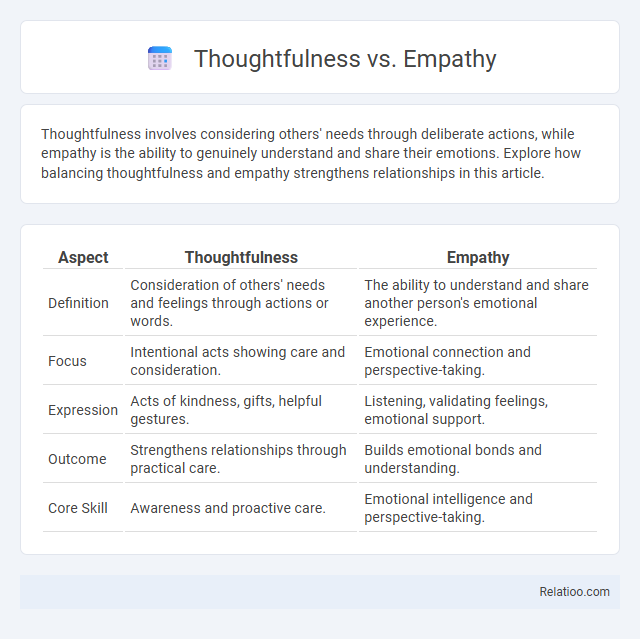Thoughtfulness involves considering others' needs through deliberate actions, while empathy is the ability to genuinely understand and share their emotions. Explore how balancing thoughtfulness and empathy strengthens relationships in this article.
Table of Comparison
| Aspect | Thoughtfulness | Empathy |
|---|---|---|
| Definition | Consideration of others' needs and feelings through actions or words. | The ability to understand and share another person's emotional experience. |
| Focus | Intentional acts showing care and consideration. | Emotional connection and perspective-taking. |
| Expression | Acts of kindness, gifts, helpful gestures. | Listening, validating feelings, emotional support. |
| Outcome | Strengthens relationships through practical care. | Builds emotional bonds and understanding. |
| Core Skill | Awareness and proactive care. | Emotional intelligence and perspective-taking. |
Understanding Thoughtfulness: Definition and Scope
Understanding thoughtfulness involves recognizing actions characterized by careful consideration and kindness towards others' needs and feelings. Thoughtfulness extends beyond empathy, which is the ability to feel others' emotions, by actively applying that awareness to support and improve others' experiences. Your ability to practice thoughtfulness can deepen relationships and foster a supportive environment through intentional, compassionate behavior.
What is Empathy? Types and Characteristics
Empathy is the ability to understand and share the feelings of others, encompassing cognitive, emotional, and compassionate types that allow you to connect on different levels. Cognitive empathy involves recognizing another person's emotions, emotional empathy is feeling what others feel, and compassionate empathy drives you to take action to help. Key characteristics of empathy include active listening, perspective-taking, and emotional resonance, which foster deeper interpersonal relationships and effective communication.
Core Differences: Thoughtfulness vs Empathy
Thoughtfulness involves careful consideration of others' needs and feelings, often expressed through deliberate actions or gestures, whereas empathy is the capacity to understand and share another person's emotions on a deeper, emotional level. Thoughtfulness emphasizes proactive kindness and practical support, while empathy centers on emotional resonance and perspective-taking. The core difference lies in thoughtfulness being action-oriented and external, contrasted with empathy being internal and emotionally immersive.
How Thoughtfulness Manifests in Daily Life
Thoughtfulness manifests in daily life through small, intentional actions such as remembering important dates, offering support without being asked, and actively listening during conversations. Unlike empathy, which involves understanding and sharing another's emotions, thoughtfulness centers on proactive consideration of others' needs and convenience. This behavior fosters stronger relationships by consistently demonstrating care and respect through mindful gestures.
The Role of Empathy in Human Interactions
Empathy plays a crucial role in human interactions by enabling individuals to understand and share the feelings of others, fostering deeper emotional connections and effective communication. Unlike thoughtfulness, which involves considerate actions and awareness of others' needs, empathy emphasizes emotional resonance and perspective-taking, enhancing relational trust and cooperation. Cultivating empathy in social and professional contexts improves conflict resolution, nurtures compassion, and strengthens interpersonal bonds.
Benefits of Practicing Thoughtfulness
Practicing thoughtfulness enhances your ability to anticipate others' needs, fostering stronger relationships and trust. This mindful consideration promotes emotional well-being by reducing conflicts and encouraging positive social interactions. By prioritizing thoughtfulness, you cultivate a supportive environment that benefits both your personal growth and community harmony.
Why Empathy Matters in Relationships
Empathy matters in relationships because it enables individuals to genuinely understand and share the feelings of others, fostering deeper emotional connections and trust. Unlike thoughtfulness, which involves considerate actions, empathy requires an emotional resonance that helps resolve conflicts and promotes mutual respect. Developing empathy enhances communication, reduces misunderstandings, and strengthens the foundation of healthy, supportive relationships.
Developing Thoughtfulness: Practical Tips
Developing thoughtfulness involves actively considering others' perspectives and needs, which enhances interpersonal relationships and fosters emotional intelligence. Practical tips include practicing active listening, reflecting before responding, and regularly expressing appreciation or gratitude to others. Incorporating mindfulness techniques can also improve awareness of one's impact on others, promoting consistent thoughtful behavior.
Cultivating Empathy: Effective Strategies
Cultivating empathy requires intentional practices such as active listening, perspective-taking, and emotional validation, which deepen your understanding of others' feelings and experiences. Developing empathy enhances interpersonal relationships by fostering genuine connections and compassionate responses. Empathy differs from thoughtfulness, which is more about considerate actions, while empathy centers on emotionally resonating with others.
Balancing Thoughtfulness and Empathy for Personal Growth
Balancing thoughtfulness and empathy involves cultivating awareness of others' emotions while thoughtfully considering the impact of one's actions. Thoughtfulness requires intentional reflection and kindness in decision-making, whereas empathy focuses on emotional resonance and understanding another's perspective. Integrating both qualities enhances personal growth by fostering deeper relationships and improving social intelligence.

Infographic: Thoughtfulness vs Empathy
 relatioo.com
relatioo.com